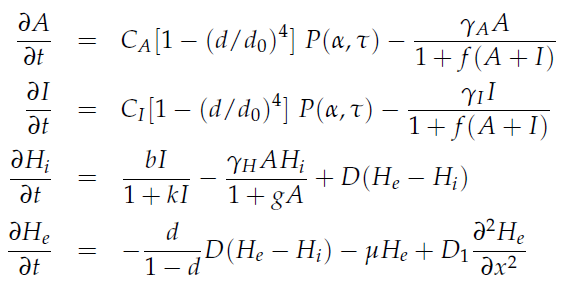Team:Wageningen UR/Project/ModelingProj1
From 2011.igem.org
(→Modeling synchronized oscillations) |
(→Modeling synchronized oscillations) |
||
| Line 37: | Line 37: | ||
{{:Team:Wageningen_UR/Templates/Style | text= __NOTOC__ | {{:Team:Wageningen_UR/Templates/Style | text= __NOTOC__ | ||
| + | |||
'''Above:''' Set of delay differential equations used by Danino et al. to model the oscillatory behaviour of the design using a positive and negative feedback loop. | '''Above:''' Set of delay differential equations used by Danino et al. to model the oscillatory behaviour of the design using a positive and negative feedback loop. | ||
| Line 47: | Line 48: | ||
'''Hi:''' internal AHL | '''Hi:''' internal AHL | ||
| - | '''He:''' | + | '''He:''' external AHL |
| + | |||
| + | The production of AiiA and LuxI depend on the internal AHL concentration. | ||
| + | [[File:Equations2_hasty_WUR.png]] describes the | ||
}} | }} | ||
Revision as of 18:09, 11 September 2011
 "
"




